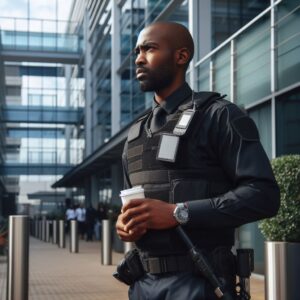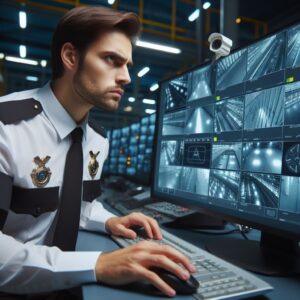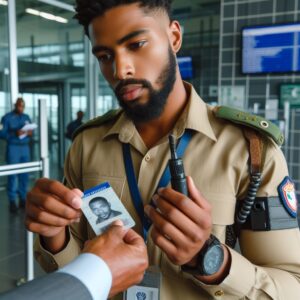Security Guards – Best Practices
As the sun sets and the cityscape transforms into a tapestry of twinkling lights, security guards remain steadfast in their duty. These unsung heroes play a pivotal role in safeguarding our commercial and residential spaces. Let’s explore the critical responsibilities of security guards, their training, and how they contribute to overall safety.

Why Security Guards Matter
First Line of Defense
Security guards are the first line of defence against potential threats. Whether it’s a bustling office complex, a residential community, or a retail store, these watchful sentinels stand ready to deter unauthorised access, prevent theft, and maintain order. Their mere presence acts as a deterrent, dissuading ill-intentioned individuals from causing harm.

Vigilance and Surveillance
Security guards are the eyes and ears of any establishment. They monitor surveillance cameras, patrol premises, and promptly respond to alarms. Their vigilance ensures that suspicious activities are detected early, allowing for swift intervention. Whether it’s identifying a potential break-in or addressing a safety hazard, their watchful gaze keeps our buildings secure.
Emergency Response
When crisis strikes, security guards are the first responders. Whether it’s a medical emergency, fire, or natural disaster, they follow established protocols to protect lives and property. Their training equips them to handle high-pressure situations, administer first aid, and coordinate with emergency services. Their swift actions can make all the difference during critical moments.
Responsibilities of Security Guards
Access Control
Security guards manage access points. They verify credentials, screen visitors, and ensure that only authorised personnel enter restricted areas. Their role extends beyond physical checks; they also enforce company policies, such as badge requirements and visitor logs. By maintaining access control, they prevent unauthorised individuals from compromising security.


Patrolling and Incident Reporting
Regular patrols are essential. Security guards walk the beat, inspecting doors, windows, and perimeters. They report any anomalies promptly, whether it’s a broken window, a malfunctioning alarm, or suspicious behaviour. Their detailed incident reports aid investigations and improve overall security protocols.
Customer Service
Beyond security, guards often serve as ambassadors. They assist visitors, provide directions, and offer a reassuring presence. Excellent customer service skills enhance the overall experience for tenants, employees, and guests. A friendly smile and helpful guidance go a long way in creating a positive environment.
Training and Qualifications
Security guards undergo rigorous training, covering areas such as:
- Emergency Response: First aid, evacuation procedures, and crisis management.
- Conflict Resolution: De-escalation techniques and handling confrontations.
- Legal Knowledge: Understanding relevant laws and regulations.
- Observation Skills: Identifying suspicious behaviour and assessing risks.
Minimum Requirements:
- Age: Security guards must be at least 18 years old.
- Citizenship: They must be either South African citizens or permanent residents.
- Criminal Record: A clean criminal record is essential. Background checks are conducted during the registration process.
- Language Skills: Security guards must be able to speak and write English effectively.
Educational Qualifications:
- The minimum educational requirement is a matric certificate (Grade 12). However, some positions may demand additional education, such as a diploma or degree in security management.
Personal Qualities:
Security guards should possess the following qualities:
- Good Communication Skills: Effective communication is vital for interacting with colleagues, clients, and the public.
- Alertness and Observation Skills: Being vigilant helps detect potential threats or suspicious activities.
- Integrity and Honesty: Trustworthiness is crucial in security roles.
- Physical Fitness and Stamina: Guards need to be physically fit to handle their duties effectively.
PSIRA Registration:
- All security guards in South Africa must be registered with the Private Security Industry Regulatory Authority (PSIRA).
- PSIRA sets standards for training and certification.
Training Programs:
- Accredited training providers offer various security guard courses in South Africa.
- These courses cover topics such as:
- PSIRA Grades: These courses are vetted and certified by PSIRA and provide essential training for security officers.
- Firearm Competency: For armed security personnel.
- Health and Safety: Including first aid and emergency response.
- Access Control, Patrolling, and Conflict Resolution.
A well-trained security guard contributes significantly to maintaining safety and order.
In a world where threats loom large, security guards remain our silent protectors. Their dedication, training, and unwavering commitment contribute to the safety of our buildings. So, the next time you pass a security guard, remember that behind the uniform lies a guardian ensuring our well-being.
By choosing a reputable security company in Cape Town, you invest in the safety of your property. SAS Security understands the unique challenges faced by businesses and residents in this vibrant city. Let us be your partner in securing what matters most.
Security guards aren’t just gatekeepers; they are the custodians of our peace of mind.
